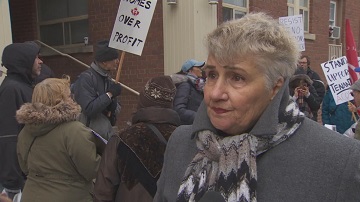 Friday, September 27, 2024
Friday, September 27, 2024  Friday, September 27, 2024
Friday, September 27, 2024 
It was a knock at the door that ignited the battle.
As Yanick Marion hustled early one morning to get to work, the manager of his apartment building had a message: “You have to leave. You don’t have a choice,” he recalls.
The manager, Marion says, was insistent that electrical upgrades were needed in the aging 36-unit complex in Montreal.
“It’s dangerous for your life, and the bank wants you to leave,” Marion says he was told.
Other tenants received the same message — and many left, watching as their former apartments were given a fresh coat of paint, new windows and appliances, and the rent went up as new tenants came in.
So-called “renovictions” are up sharply across Canadian cities, complicating an already challenging housing situation.
In 2018, there were 37,000 new apartments built nationwide, but demand increased by 50,000 units, according to tracking done by the Canada Mortgage and Housing Corporation.
The smallest provincial capital, Charlottetown, has one of the lowest rental vacancy rates in the country. It hovers just above zero per cent, and new Kijiji rental listings last just minutes before apartments are snapped up.
In Montreal, housing advocate Martin Blanchard says it’s a scenario that has happened before — every time vacancy rates drop toward zero, new owners snap up rental stock, renovate the units and increase the rent.
“We used to get 50 to 100 calls per year,” from people complaining about being forced out of their apartments by landlords, says Blanchard, a community organizer with Comité logement de la Petite Patrie, a housing advocacy group. “Now we get many hundreds every year. It’s a crisis.”
Blanchard points largely to foreign firms, which are buying up older apartment complexes in Canada’s big cities and attempting to jettison existing tenants so the rent can be jacked up beyond limits set by provincial governments.
“It’s a way of making outrageous profits in a very short time. So they’ve got a little money put down, you can make a lot of profit, but it involves putting people on the street.”